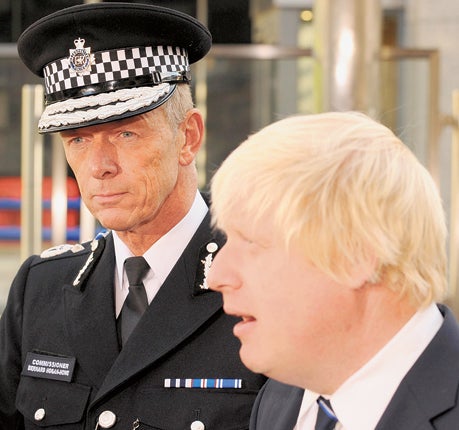Merseyside's gang-buster Bernard Hogan-Howe gets a new beat as head of the Met

The new commissioner of Scotland Yard has promised a more transparent era under his command in the wake of the phone-hacking scandal while vowing to make criminals fear the police.
Bernard Hogan-Howe was appointed to the top job in British policing after a successful period as chief constable of Merseyside where he presided over a reduction in crime of a third.
Theresa May, the Home Secretary, described Mr Hogan-Howe, 53, as a "tough, single-minded crime fighter" while the London Mayor, Boris Johnson, said he would restore confidence and crack down on disorder.
He takes over at one of the most difficult times in the history of the modern service.
The search for a new Metropolitan Police commissioner was sparked by the resignations of Sir Paul Stephenson and former assistant commissioner John Yates – both of whom quit amid the widening investigation into police conduct and tabloid phone hacking.
But as well as coping with the continuing Operation Weeting, Mr Hogan-Howe must oversee the police response to inquiries into this summer's riots, the fight against terrorism as well as leading the capital through the 2012 Olympics.
The Yorkshireman described his appointment as the "highest accolade that any police officer could have" and paid tribute to his predecessor.
In a message to the people of London he said: "I intend to lead the Met so that it makes criminals fear, that it keeps the trust of the public of London in the Metropolitan Police, and finally the Metropolitan Police that the Metropolitan Police officers and staff are proud of."
A vocal critic of health and safety culture and excessive bureaucracy, Mr Hogan-Howe enamoured himself to the Home Secretary and the Tory party with his no-nonsense approach. He outraged Gordon Brown when he was Prime Minister by suggesting he was soft on crime and demanding that convicted gun criminals should serve a minimum of five years in prison.
After leaving school following A-levels and four years working in the health service he began his policing career aged 22 in his native Sheffield. In 1981 he was on duty the night that Peter Sutcliffe was arrested in the city and took part in the policing of the miners' strike in Doncaster. He went on to oversee a radical overhaul of the South Yorkshire force after being fast-tracked to the senior ranks via an Oxford masters degree in law.
During his tenure on Merseyside he led a "total war" against wrongdoers – charging detectives with targeting known gun criminals and deploying uniformed officers to disrupt the activity of those on its fringes.
Under his command Merseyside recovered £20m in assets from convicted criminals – the highest figure for a force outside London.
Since his appointment as chief constable in 2004 he presided over the conviction of the killer of schoolboy Rhys Jones in Liverpool and the prosecution of the racist murderers of black teenager Anthony Walker.
In a notable example of leading from the front while chief constable he ordered his police driver to chase a speeding driver before setting off on foot to make the arrest himself when the man tried to run away.
It was his particular pleasure to combine his pleasures of horse riding with his obvious pride in leading the region's police force when he would accompany the triumphant jockey to the winner's enclosure at Aintree on Grand National day.
Although he was linked with the top job at the Met in 2008, having previously worked there as an assistant commissioner – and suggested as a possible replacement for Mike Todd at the head of Greater Manchester Police following his death – Mr Hogan-Howe returned to London two years ago for a senior job with Her Majesty's Inspectorate of Constabulary.
He beat Strathclyde Police chief Stephen House, acting Commissioner Tim Godwin and Sir Hugh Orde to the £260,000-a-year role after several rounds of interviews with the Home Office and Metropolitan Police Authority.
His bulging in-tray
Phone hacking
Rooting out corruption within a force tainted by revelations of improper relationships with journalists will be high on his agenda. Operation Elveden is investigating claims that officers had been bribed to give journalists information. Some arrests have already been made.
A smaller budget and job cuts
The Met's budget for this year has already been cut by £33m and is set to fall by more. More than 1,000 backroom jobs have gone in the last eight months, while the number of officers on the beat will be reduced by 455 over the next three years.
The 2012 Olympics
The Games will be the largest logistical operation in the force's history, and likely to be the biggest headache for the Commissioner. Up to 12,000 officers will be kept on duty to ensure the safety of the athletes, spectators and guests. With hundreds of millions of people watching the Games around the world, senior Met officers are concerned they provide the perfect target for a terrorist attack.
The riots
Thousands of officers from other forces had to be drafted in amid allegations that the Met could not cope with the scale of the unrest in London. The cost of policing the riots currently stands at £34m, and Scotland Yard expects this figure to rise even further. If so, it will exceed the total cost of policing all major public order events in the capital last year.
MATT BLAKE